Canaan Dog
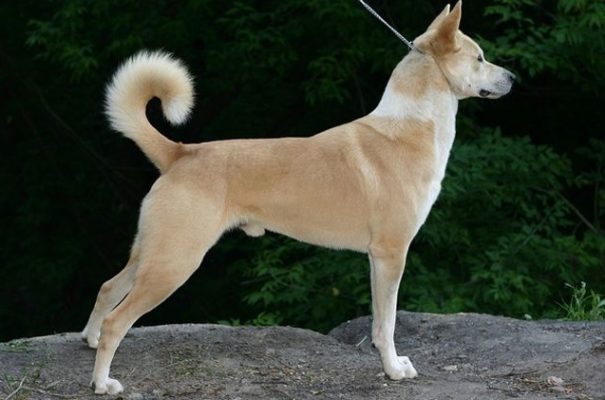
The Canaan Dog is wary of strangers and wary of new surroundings. This breed is characterized by lightning-fast reaction and excellent guarding qualities. The four-legged dog easily finds contact with children and becomes very attached to its owner.
Table of Contents
Breed Information
| Another Name | Israel Canaan Dog, Bedouin Sheep Dog, Palestinian Pariah Dog |
| Origin | Middle East |
| Height | Males 51-61 cm Females 48-58 cm |
| Weight | 16-25 kg |
| Fur | Double, dense undercoat and coarse cover hair |
| Color | White, black, sand, red-brown, gold, cream |
| Lifespan | 12-15 years |
| FCI Classification | Spitz and primitive types |
| Group | Watchdogs |
| Price | $800-1000 |
Breed Photos
Origin History
The Canaan Dog originated in Israel. The breed was not bred on purpose – it was originally a wild animal. The nomadic Arabs saw in the four-legged dog the ability to guard housing and protect, but they were not interested in breeding a separate species. In the 1930s, Rudelphine Menzel became interested in these dogs. The breeder was surprised at how easily these dogs could be trained. Also, Rudelfina noted the possibility of using the animals for service.
Half-dogs of the breed still exist in Israel, and the Canaan Dog was registered with the FCI in 1966. The four-legged dogs of this species are intelligent and friendly and lack aggression and cowardice.
Appearance
The Canaan Dog is a medium-sized pet with an undercoat and a dense coat. The color varies from white to red-brown; there are also individuals of black shade. The dog has a broad chest, muscular neck, and tail curled to the back.
The pet is on sturdy paws. Males are noticeably larger than females; the breed representatives’ ears are slightly rounded at the ends. The head is proportional; the almond-shaped eyes are dark brown with a rim.
Character
The Canaan Dog is wary of strangers and wary of new surroundings. This breed is characterized by lightning-fast reaction and excellent guarding qualities. The four-legged dog easily finds contact with children and becomes very attached to its owner.
The pet is intelligent and quick to learn. It is important to socialize the Canaan at an early age and teach “cancel” commands. It is necessary to pacify the pet in the event of a dispute with other animals. It would help if you did not leave the pet alone for long periods because this can cause depression in the background of strong attachment.
Care
The Canaan Dog requires a lot of attention in grooming. A thick coat needs to be bathed thoroughly 1-2 times a month. Combing will have to be done almost every day, especially during shedding. If you do not remove loose hair, it will litter the apartment and may cause allergies. Use special shampoos and conditioners for bathing to make it easier to comb through the thick coat afterward. Trim claws in time and keep an eye and ears clean.
Training
The Canaan Dog quickly learns any commands. Cynologists recommend learning “canceling” commands right away because the dog tends to conflict with other animals. The dog is very energetic, so combine intellectual training with physical activity. Early puppy socialization is important, so people and animals don’t cause stress.
Work with your pet systematically. Canaan is a quick learner, but repeating what you’ve learned doesn’t hurt. Have different ways of doing the same exercise to keep your pet interested in learning.
Praise from your owner is the best motivation to follow commands. Don’t forget to give a treat in the form of a dog cookie or other yummy treat for difficult exercises. Don’t raise your voice if your dog doesn’t understand a command or hit your pet. It will not work, and your dog’s psyche may be compromised.
Common Diseases
Keep an eye on your dog’s mucous membranes and overall health to detect and prevent disease in time. Canaan Dogs have good health, but there are weaknesses. Here are examples of Canaan diseases:
- hip dysplasia;
- epilepsy;
- cryptorchidism;
- eye disease.
Nutrition
The Canaan Dog is unpretentious about food. Representatives of this breed do not experience discomfort in case of water shortage and easily tolerate the heat. Nutrition should be balanced. The animal is mobile, so calcium, carbohydrates, and proteins must be in sufficient quantities. Vitamins and minerals can be given in fresh fruits and vegetables, or a special complex can be purchased.
When feeding natural food, give porridges, meat, and dairy products. If you don’t have time to cook, choose suitable food. Your pet’s overall health and condition depend on the food, so pay attention to the composition of the food.
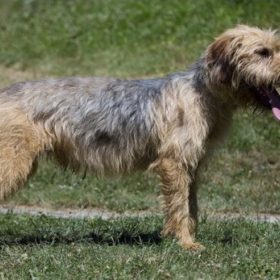 Barak
Barak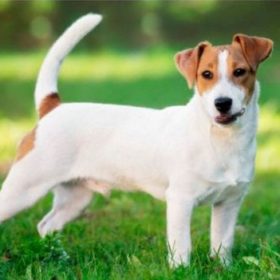 Jack Russell Terrier
Jack Russell Terrier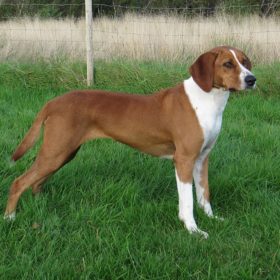 Hygen Hound
Hygen Hound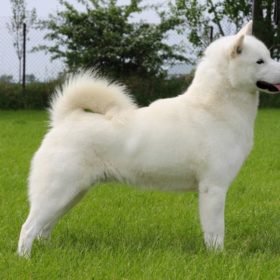 Kishu
Kishu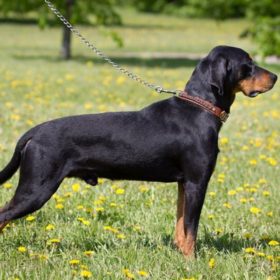 Lithuanian Hound
Lithuanian Hound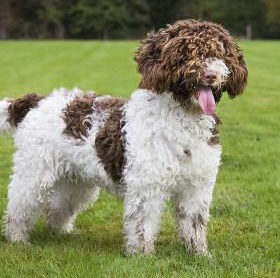 Spanish Water Dog
Spanish Water Dog